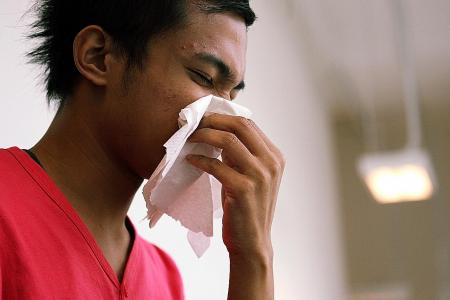How to make your allergies go away when spring cleaning for CNY
Have you been caught up in the whole Marie Kondo craze? Or simply packing and repacking items in your house because Chinese New Year is around the corner?
As you get into the rhythm of spring cleaning, you may find your nose start to tickle, or you may even begin to sneeze uncontrollably and continuously.
That's when you'd wonder if it is an allergic reaction.
An allergy is a common condition where one's immune system overreacts with substances that are usually harmless for most people.
These allergens include house dust mites, pollen, moulds (fungi), pet danders, insect stings/bites, and certain types of medicines and foods.
Allergies are more common in people with atopy (genetic/hereditary tendency for allergy), family and personal history of allergic rhinitis (sensitive nose), eczema (sensitive skin) and asthma (sensitive airways).
When exposed to allergens, the immune reaction is triggered.
Subsequently, the allergic person produces Immunoglobulin E (IgE) antibodies, which results in the release of histamine - the chemical responsible for the various inflammatory symptoms that can be uncomfortable and distressing.
There are several ways we can deal with and treat allergies:
AVOIDANCE
We can try our best to avoid the offending allergen. But it is not feasible to do so for certain allergens, especially inhalant allergens. And avoidance alone is usually inefficient.
ANTI-ALLERGIC DRUGS
Medications like oral antihistamines, oral decongestants, nasal sprays and corticosteroids can help ease or reduce symptoms caused by allergies as long as the symptoms are not serious or life-threatening.
However, they do not treat the allergy condition. This means symptoms typically appear again when you stop taking the drugs.
For example, dust mites allergy is very common in those with allergic rhinitis. It is almost impossible to avoid dust mites completely, so patients will usually have to be on long-term medications for symptom control.
SUBLINGUAL IMMUNOTHERAPY (SLIT)
Immunotherapy is the only treatment capable of treating the root cause of the allergy.
This therapy works by desensitising and downregulating the body's reaction towards a specific allergen responsible for producing symptoms, hence gradually modifying the body's allergic responses over time.
This is accomplished by intentional regular exposure of the specific allergens administered via under the tongue (sublingual spray).
Sublingual immunotherapy significantly improves quality of life, reduces consumption of medications and reduces risk of developing asthma and new allergies in the future.
It is strongly recommended in World Allergy Organisation clinical studies, which show success rates of up to 80 per cent, especially for inhaled allergens.
Improvement of symptoms can be seen as early as two to three months from the start of therapy.
The recommended duration of treatment is three to five years, so a commitment from the patient is necessary to help determine the success of the treatment.
Persistent effects from immunotherapy have been documented to last up to 10 years.
Slit is safe for children as young as two years old, and only about 1 per cent of patients report temporary mild itching/tingling under the tongue, which resolves within a week.
The writer is a resident doctor at the DTAP Clinic Group
Get The New Paper on your phone with the free TNP app. Download from the Apple App Store or Google Play Store now



